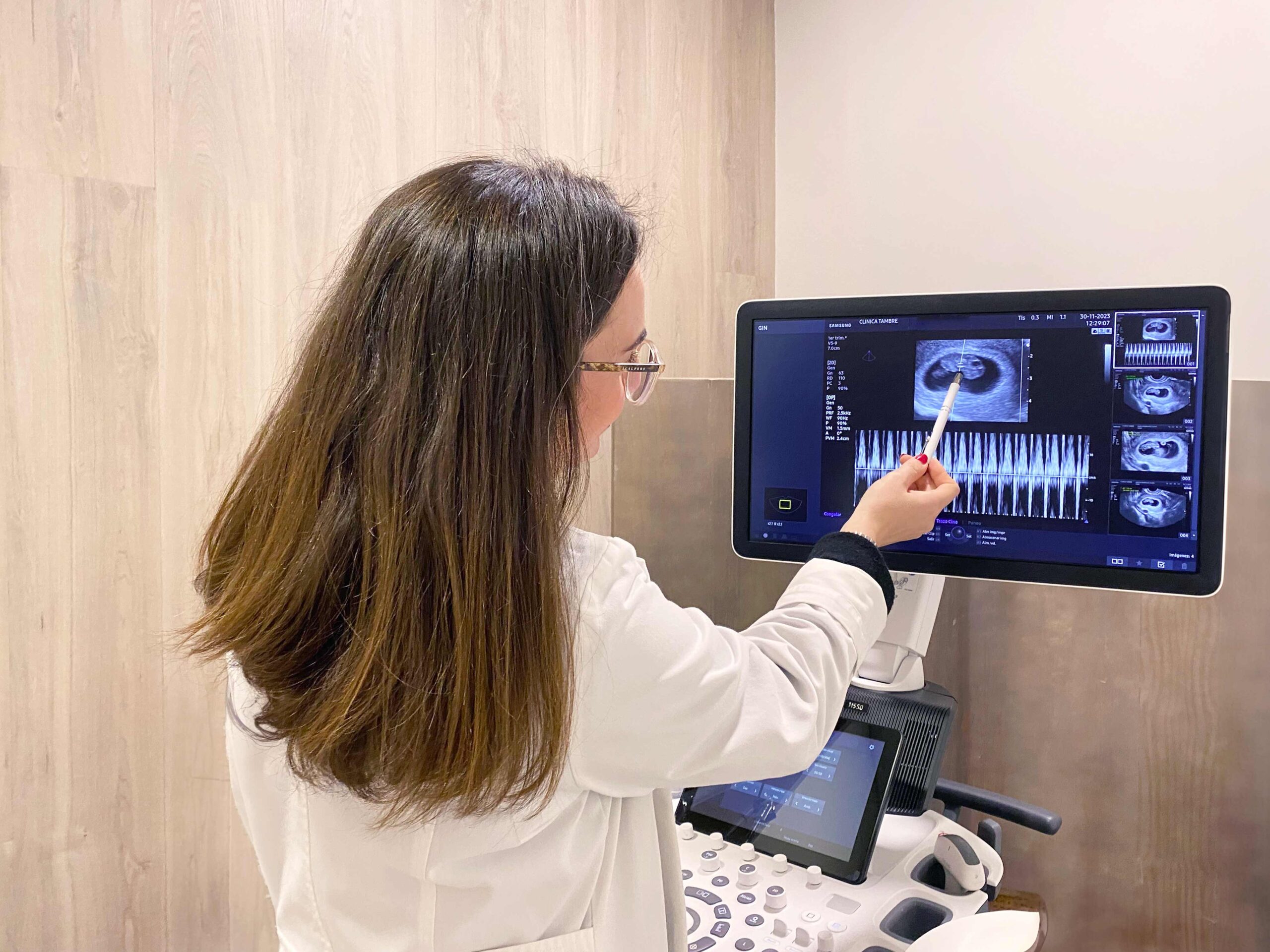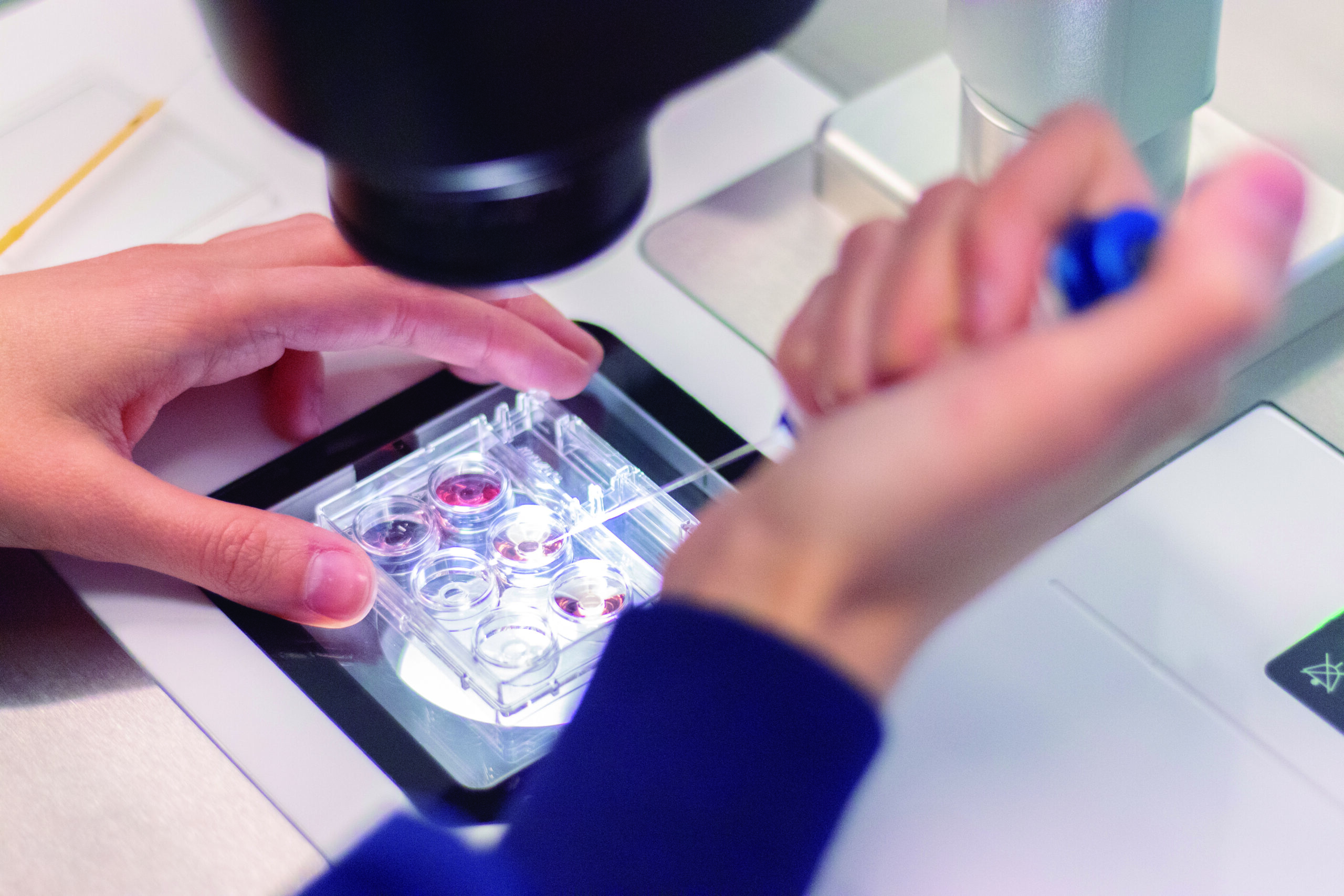Table of contents
The moment of embryo transfer to the maternal uterus is as important as all the other steps of IVF treatment. After having obtained a quality embryo, we must ensure that we have a receptive endometrium that can facilitate implantation and the achievement of pregnancy. At the Tambre Clinic we leave nothing to chance. That is why we perform personalised endometrial preparation, in order to increase the chances of pregnancy.
Why is it important to perform an endometrial preparation?
The endometrium is the layer that lines the inside of the uterus, and is primarily responsible for the implantation of embryos. Throughout the cycle, the endometrium thickens and changes shape according to the actions of hormones. If there is no pregnancy, the endometrium is shed and eliminated at the end of the cycle during the menstrual period.
If at the time of the transfer, the endometrium is not ready and is not in the receptive period, known as the window of implantation, the embryo will not be able to implant.
That is why at Tambre, we only perform the transfer if we are sure that the endometrium is in optimal conditions. If not, we must wait for the next cycle.
And what are these requirements that the endometrium has to meet to achieve implantation? Basically, there are three conditions:
1- Adequate thickness. The uterus is considered ready for implantation when it measures between 7 and 12 mm. Values below 6 mm are of poor prognosis, and are related to implantation failure and could justify a negative result.
2- Good appearance. In the control ultrasounds we should observe that the structure of the endometrium is trilaminar, that is to say, that it has three layers, and also that the surface is regular. If so, we can consider that the chances of achieving pregnancy are high.
3- Receptive. The endometrium is only receptive on certain days of the cycle. This is known as the “window of implantation” and usually occurs between days 19 and 21 of the menstrual cycle (5-7 days after ovulation). Another strategy we are developing is to open the implantation window with medication, in an artificial cycle.
Therefore, we must try to synchronise the timing of the embryo with the receptive state of the endometrium in order to perform the transfer at the right time, and this is where endometrial preparation is crucial.
Treatments for endometrial preparation
In order to ensure that the endometrium meets the necessary conditions to increase the chances of pregnancy, one medication or another is administered, depending on the assisted reproduction treatment we are performing:
– Artificial insemination and IVF cycles with fresh own eggs
In this type of treatment, progesterone is only administered in the second phase of the cycle, that is, after the follicular puncture or insemination has been performed. Thus, in the first phase of the menstrual cycle we follow an endometrial preparation with a natural cycle, for which we depend exclusively on the development of the woman’s follicle and endometrium.
– Egg donation, frozen egg or embryo cycles and ROPA method
In these cases, endometrial preparation is of particular importance for the success of these treatments. Priority is usually given to endometrial preparation with a substituted cycle, where estrogens are administered from the beginning and when we see that the endometrium is ready, progesterone is added to open the implantation window and synchronise it with the embryo.
This type of endometrial preparation is recommended for women who have not been successful with a natural cycle, who have no periods or whose menstrual cycles are very irregular. We also use endometrial preparation with substituted cycle when our patients come from outside Spain or live far from our clinic in Madrid. However, a natural cycle could also be used in candidate patients.
Within the substituted cycle we can opt for different options depending on the particular circumstances of each woman:
– Provide a GnRH analogue (decapeptil or gonapeptil). In the case of patients with endometriosis and uterine adenomyosis, this treatment can be used, since both pathologies depend on estrogens. This improves synchronisation.
During the endometrial preparation, we perform ultrasound controls to measure the endometrium and check the patient’s response to the medication. If necessary, we can readjust the dose or change the mode of administration.
It should be made clear that, in Tambre, pregnancy rates with a natural cycle or substituted cycle are similar. Therefore, the important thing is to determine which method is the most appropriate for each patient. Therefore, at the Tambre Clinic, we perform personalised treatments, including endometrial preparation, in order to multiply your chances of pregnancy.
Artificial intelligence to assess endometrial receptivity
To verify that the endometrium is in optimal condition and meets the requirements for embryo transfer, Tambre is conducting a clinical study, called the Matris Project, which uses an algorithm with thousands of ultrasound scans. Thanks to artificial intelligence we can determine if the endometrium is receptive before the transfer, which prevents us from losing the embryo and allows us to reduce the time to achieve pregnancy as much as possible.
Thus, the Tambre Clinic has become one of the pioneers in the use of big data to introduce improvements in assisted reproduction. This study at the clinical level allows for improved endometrial classification thanks to the development of an AI-based system that predicts the time at which the endometrium of the expectant mother is fully receptive for successful implantation.
If you need more information about endometrial preparation, as well as the other methods and treatments of assisted reproduction, do not hesitate to call us at 91 411 61 11, to request your first appointment. Our team of specialists in Advanced Reproductive Medicine will evaluate your fertility, study your previous implantation failures or miscarriages, and determine the most appropriate treatment for you. At Tambre we offer you the support and experience you need to fulfill your dream of becoming a mother.
At Tambre, we are committed to your dream of becoming a mother.



